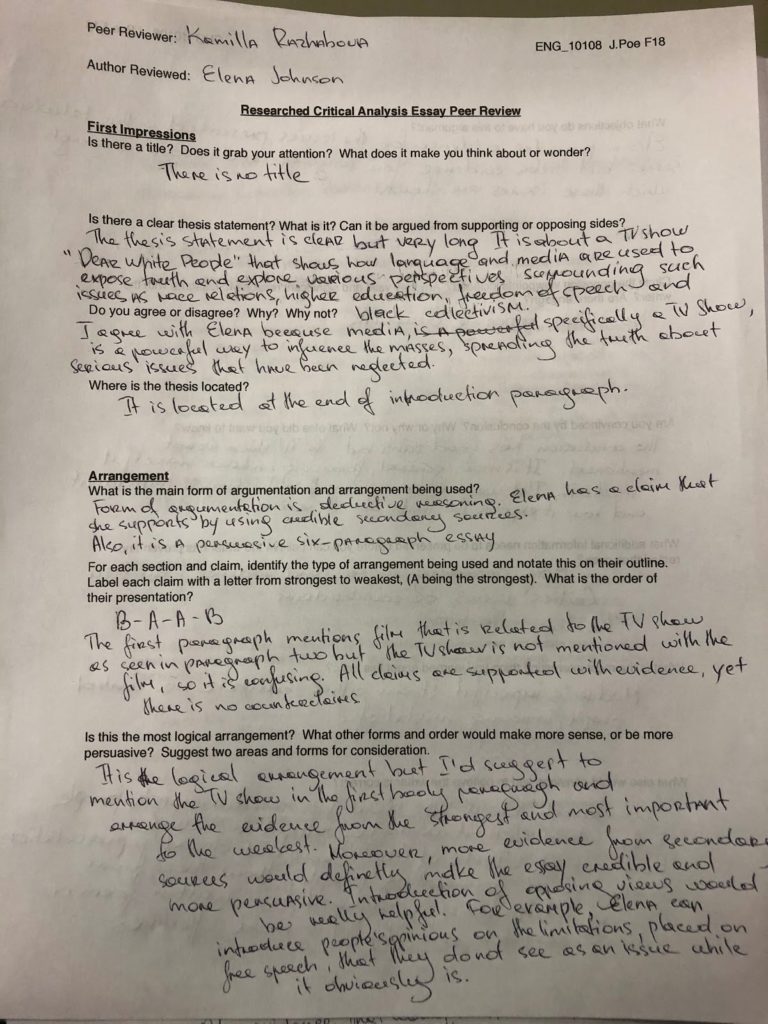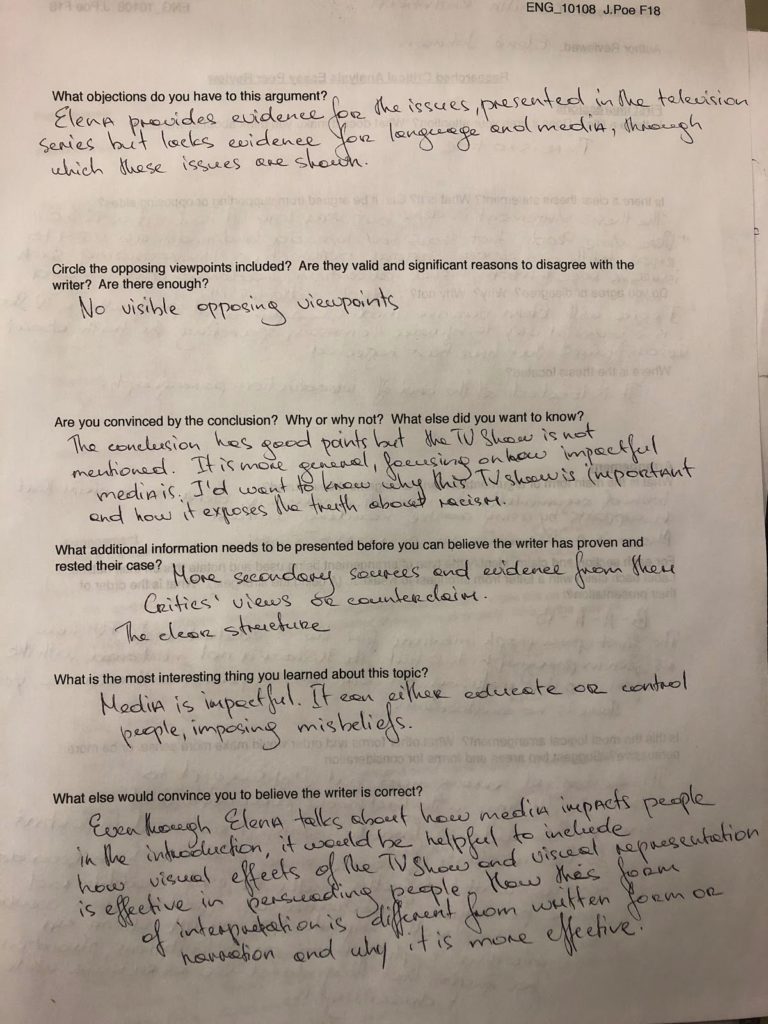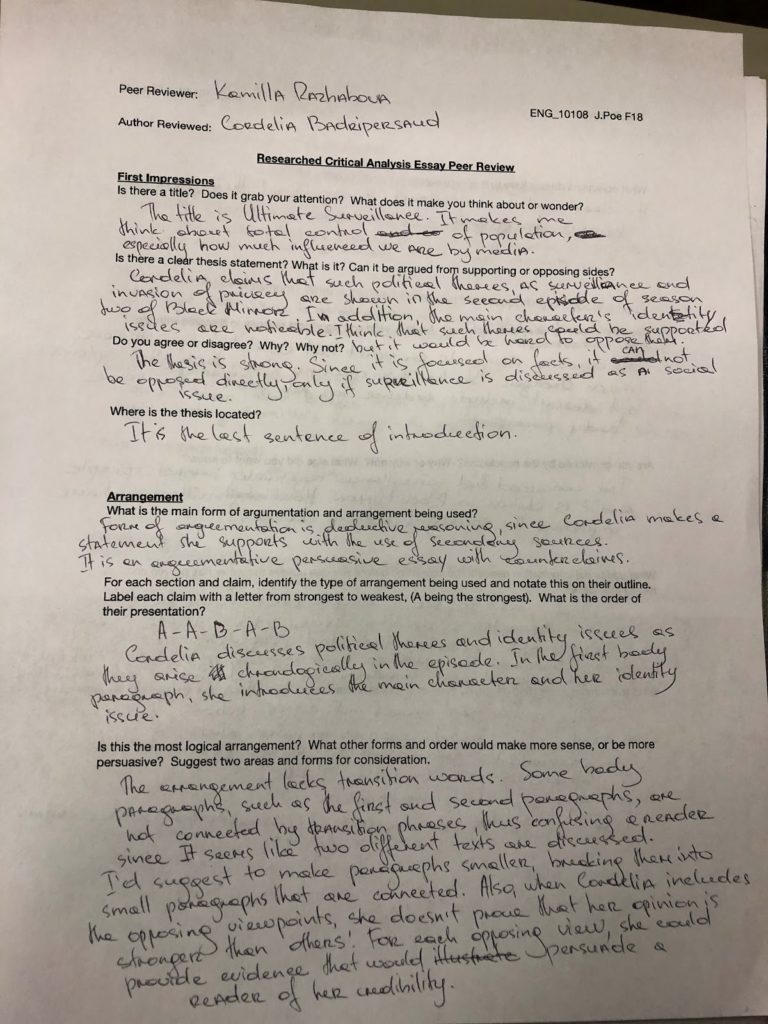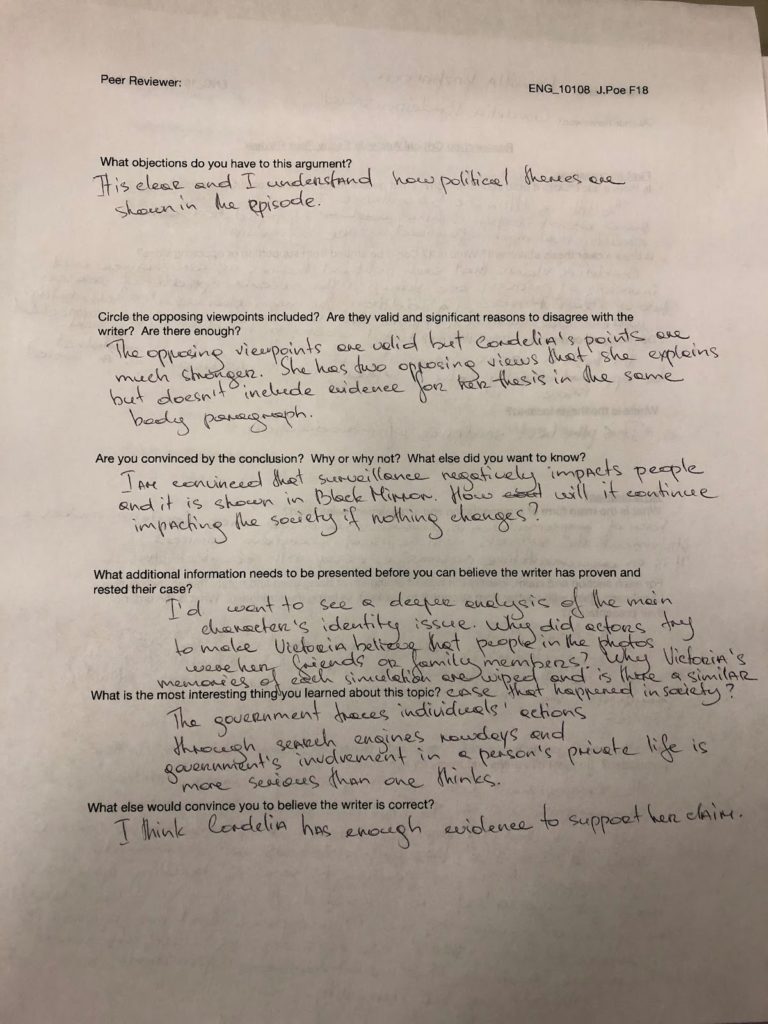How I have met the course learning objectives:
- I engaged in the collaborative and social aspects of this writing process by commenting on my classmates’ drafts and receiving constructive criticism on my drafts.
- I composed a text that integrates my stance with appropriate sources using strategies such as summary, critical analysis, interpretation, synthesis, and argumentation.
- I applied my knowledge of MLA – format citation.
My Researched Critical Essay:
Kamilla Razhabova
Professor Poe
FIQWS 10108 HA16
17 December 2018
The Past Is Present: The Social Issues Of Pride And Prejudice In Bridget Jones’s Diary.
How does one draw a visible line between an adaptation and a fanfiction? Some people may argue that a fanfiction is a form of interpretation that is equivalent to an adaptation. However, a fanfiction is built on the existing characters and the background story, which is either altered or further developed with the use of literary devices to engage the audience, introducing thrilling plot alterations in the narrative form. In contrast, an adaptation of any text might be either identical to the original text or modernized, conveying the predominant social, political or economic views in a different time period.
Bridget Jones’s Diary, a film directed by Sharon Maguire, is an adaptation of Pride and Prejudice, which is a famous classic novel, known for its illustration of conventional views of Regency England from a feminine perspective. The author of the novel, Jane Austen, “provides clues to her dissatisfaction with the limitations imposed by society” through the protagonist Elizabeth Bennet, raised in a middle-class family (Chang 76). In the novel, Elizabeth’s initial hatred for the main male character, Mr. Darcy, turns into unconventional love that leads to a happy marriage. The progressive ideas of Pride and Prejudice, concerning women’s rights and gender roles, have gained recognition, resulting in its numerous adaptations. Bridget Jones’s Diary is a film based on a novel Bridget Jones’s Diary by Helen Fielding, which portrays the social expectations and limitations of the 21st century through the protagonist Bridget Jones, a 30 years old woman, troubled by her lifestyle. While Bridget Jones’s Diary illustrates the social problems of the 21st century that correspond to those of the 18th century depicted in Pride and Prejudice, its portrayal of progressive feminism compared to feminism seen in Austen’s novel is problematic, since it seems to disregard Elizabeth and other early feminists’ attempts to overturn the male superiority in society.
The communal expectations and norms of Pride and Prejudice are reflected in the opening of the novel, “It is a truth universally acknowledged that a single man in possession of a good fortune must be in want of a wife” (Austen 1). Mrs. Bennet, Elizabeth’s mother, is troubled by her daughters’ single status, since none of them can inherit her husband’s wealth and possessions (Austen 18). The communal norms put pressure on Mrs. Bennet, who only desires to see one of her daughters happily settled at Netherfield and “all the others equally well married” (Austen 6). In order to be an “accomplished woman”, Elizabeth must be married to a wealthy gentleman, financially securing her future and elevating her family’s status. The communal expectations, activities and norms reflect the 18th century society, functioning as a primary figure in the novel since, according to Deresiewicz, it is “the story of how a community thinks, talks, exerts influence” that produces Elizabeth (509). Elizabeth is raised in this community, absorbing its norms and beliefs as a child. She is taught to think and act a certain way. Even though she develops an independent thought on women’s position in society, observed through her actions, her subconscious mind holds the beliefs of her community. Without such social influence, Elizabeth wouldn’t think about the existence of inequality in society in the first place.
Since Elizabeth is greatly influenced by her community, she is not presented separately, but rather as a member of her community. Deresiewicz states, “she asserts to and helps propagate collective judgments; she takes her opinions for universal truths. . .” (509). When Elizabeth meets Mr. Darcy, “a tall person with handsome features” and in possession of wealth, she despises him for his excessive pride, and he finds her unattractive due to his overall experience at the party, organized by the Bingley family, “She is tolerable, but not handsome enough to tempt me” (Austen 7-8). Both Elizabeth and Mr. Darcy have critical first impressions of each other that Elizabeth eagerly shares with her friends, seeking support and validation of her point of view. Her friends and even mother say that “he is a most disagreeable, horrid man, not at all worth pleasing”, thus elevating her self-esteem (Austen 9). Elizabeth acts as her objectors by judging Mr. Darcy’s behavior from her first interaction with him. She sees his cold exterior just like her friends and family do, who decide if he’s worth Elizabeth’s affection, and evaluates his personality through the communal expectations.
Some might claim that Elizabeth’s independence is illusionary since it extends to a certain point. Deresiewicz states, “in a community that includes everyone by allowing each a slightly different role, the role it allows her – but it is only a role – is that of the person who is not fully included” (514). While Elizabeth is a member of her community, “her views lead to real change in Mr. Darcy’s moral character”, demonstrating that her role extends beyond her community (Chang 77). Mr. Darcy is an affluent man. By changing his prideful nature, Elizabeth demonstrates a female’s ability to influence rich men as much as they do, balancing gender roles. She doesn’t only play a role. Her union with Mr. Darcy illustrates the possibility of altering the male dominant view in society.
In the 21st century society, Bridget Jones has to live up to the beauty standard as a skinny, perfect woman, who is in a relationship. Bridget’s concerns with her unhealthy habits, such as drinking and smoking, weight and single status that arise due to the social expectations, make her start a diary, in which she will “tell the truth about Bridget Jones” (Maguire). In her diary, Bridget writes about losing twenty pounds and finding a sensible boyfriend to go out with and quit forming “romantic relationship with alcoholics, workaholics or commitment-phobics” for her New Year resolutions (Maguire). Bridget’s diary that Elizabeth doesn’t have in Pride and Prejudice, “reveals the external pressure she feels to be better than she is” (Marsh 57). Bridget’s colleague asks her to put on some makeup for a live television translation so that she would look appealing to the audience. In her society, makeup is used as a part of the beauty standard that almost every woman follows. Also, Bridget is pressured by her mother, who thinks about her daughter’s relationship status, just like Elizabeth’s mother, trying to find her a perfect match. Mrs. Jones arranges a New Year party, inviting her target Mark Darcy, an educated rich man named after Mr. Darcy in Pride and Prejudice, and his family. Bridget’s forced introduction to Mr. Darcy results in her immediate hatred for him that she, just like Elizabeth, expresses in her discussions with her friends. Mrs. Jones’ short-temper, seen when she constantly points out Bridget’s relationship status, reflects the beliefs of the 21st century society, some of which have remained predominant since the 18th century, illustrating its huge impact, lasting for centuries.
The communal expectations of Pride and Prejudice arise from gender roles in Regency England. In the 18st century, “women were subservient to men in many ways, having nearly no property rights, legal rights, or control over their own destinies” (Chang 77). To financially support themselves, women had to either have a high position job in the patriarchal society or marry into wealth. Moreover, young women, such as Elizabeth and her sisters, were often educated in the house, where they were also taught proper manners and prepared for marriage. It explains why Mrs. Bennet’s only goal is “to get her daughters married” since it is the only chance to financially secure her family and become a part of high society (Austen 4).
Elizabeth’s peer, Charlotte Lucas, represents stereotypes of traditional women of marriageable age who modify themselves in the pursuit of a husband (Chang 78). When talking to Elizabeth, Charlotte says “in nine cases out of ten a woman had better show more affection than she feels” in order to get a man’s attention (Austen 13). While Elizabeth emphasizes the presence of a real connection in a relationship, Charlotte believes that a man’s attraction to a woman is of more importance than her feelings for him, thus illustrating how deeply ingrained the notion of female’s submissiveness to men was in Regency-era woman’s mind.
Bridget Jones’s Diary portrays a huge transformation, concerning gender inequality, observed in Pride and Prejudice. Bridget “owns an apartment in central London” and “holds jobs in publishing and television” (Marsh 78). Bridget earns money from working without worrying about her financial stability, which is seen as the only way to survive in Pride and Prejudice because women, raised in an upper-class family, could work.
According to Norah Vincent, Bridget Jones is a feminist, “living out exactly the farce for which her persecutors set the stage” (Marsh 53-54). I disagree with Vincent’s statement because Bridget represents the postfeminist views that haven’t just granted women equal rights but made them ignorant of women’s past achievements for equal justice. Even though women can control their own destiny, earning money and buying property, there is no change in “a romantic ideology which accords them value only through reference to man” (Gamble 65). Moreover, Bridget “has little real conception of feminism at all” (Gamble 64). After receiving an inappropriate email from her boss about her “nonexistent skirt”, which might be a case for sexual harassment, she begins wearing a see-through top, trying to get her boss’ attention (Maguire). Thus, Bridget disregards feminists’ attempt to dress as they desire without being judged through a man’s perception and to be independent. Bridget seeks attention from men while Elizabeth faces criticism, trying to alter her family and friends’ thought on the greater importance of a man’s affection and attention than a woman’s real feelings.
Jane Austen is one of the 18th century novelists, who expresses her feminist views through Elizabeth. According to Chang, “Elizabeth’s ability to exert positive influence over one of society’s most affluent men, Mr. Darcy, offers evidence for a feminist ability to subvert the male-dominated society of Regency England” (76). When Mr. Darcy claims that in order to be called accomplished, “a woman must have a thorough knowledge of music, singing, drawing, dancing, and the modern languages, to deserve the word. . .”, Elizabeth opposes his high expectations, saying that she’s never met a woman who would have all these traits (Austen 25). Elizabeth is happy with her achievements that clearly can’t be defined by Mr. Darcy’s words. Mr. Darcy’s proposal to Elizabeth illustrates how she has changed his mentality on the notion of an accomplished woman, since she doesn’t possess all qualities. Thus, Elizabeth positively influences Mr.Darcy by changing his limiting beliefs, confirming her feminist perspective. Compared to Bridget, Elizabeth is a feminist, actively going against her communal norms while Bridget seems to accept it.
Even though Bridget Jones’s Diary is a loose adaptation of Pride and Prejudice, Bridget Jones’s Diary illustrates how society is still affected by social expectations that existed two hundred years ago. In her thirties, Bridget is pressured by her mother to get married and mocked by her friends, asking “Hey, Bridge, how’s your love life?” (Maguire). Elizabeth is criticized for her refusal to marriage proposals that Mrs. Bennet turned into the business of her life, since Elizabeth and her sisters were educated for the marriage, rather than work. Bridget Jones’s Diary is not only a comedy that uses the plotline of Pride and Prejudice, it contains an important message on the destructive effects of social expectations placed on women in society.
Works cited:
Austen, Jane. Pride and Prejudice. Project Gutenberg, 2008. https://www.gutenberg.org/files/1342/1342-pdf.pdf . Accessed on Nov. 23 2018.
Maguire, Sharon, director. Bridget Jones’s Diary. Little Bird, StudioCanal, Working Title Films, 2001.
CHANG, Hui-Chun. “The Impact of the Feminist Heroine: Elizabeth in Pride and Prejudice.” International Journal of Applied Linguistics and English Literature [Online], 3.3 (2014): 76-82. http://www.journals.aiac.org.au/index.php/IJALEL/article/view/1053 . Accessed on 25 Nov. 2018.
Gamble, Sarah. “Growing up single: the postfeminist novel.” Studies in the Literary Imagination, vol. 39, no. 2, 2006, p. 61+. Literature Resource Center, http://link.galegroup.com.ccny-proxy1.libr.ccny.cuny.edu/apps/doc/A172906651/LitRC?u=cuny_ccny&sid=LitRC&xid=936ac8ab . Accessed 24 Nov. 2018.
Deresiewicz, William. “Community and Cognition in Pride and Prejudice.” ELH, vol. 64 no. 2, 1997, pp. 503-535. Project MUSE, https://www.jstor.org/stable/30030146 . Accessed on 24 Nov. 2018.
Marsh, Kelly A. “Contextualizing Bridget Jones.” College Literature, vol. 31, no. 1, 2004, pp. 52–72. JSTOR, JSTOR, www.jstor.org/stable/25115173 . Accessed on Nov. 25 2018.
My Self-Assessment:
My Rough Draft:
Peer reviews:






